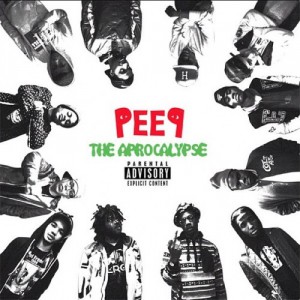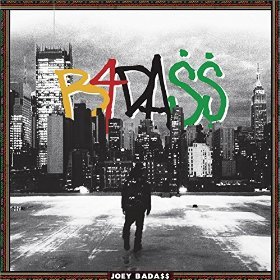
BY ALTUĞ KARAKURT (EE/III)
altug.karakurt@ug.bilkent.edu.tr
The New York hip-hop scene had its golden era during the 90s, with the appearance of many iconic hip-hop figures such as Wu-Tang Clan, Public Enemy, Mos Def, MF DOOM, Notorious B.I.G., Jay Z and Nas, along with their classic releases, such as “36 Chambers,” “Illmatic,” “Reasonable Doubt” and “Ready to Die,” which still influence the genre significantly. Although most of these rappers, and many more I haven’t listed here, are still active, the musical quality of that decade wasn’t achieved again for a long time.
During the golden era, conscious rap was on the rise. Songs about economic injustice and racial discrimination and overall socially aware lyrics became quite common. However, as of the beginning of the 2000s, this subgenre became quite idle, due to a general decline in the quality and depth of most mainstream hip-hop.
In the last few years, a new generation of rappers, such as El P, Action Bronson, Bishop Nehru, A$AP Rocky and Pro Era, has rapidly been gaining fame and enriching New York hip-hop. Considering their dedication and the quality of their releases, I think we are witnessing the rebirth of the New York hip-hop scene with this young and creative wave.
 From among these artists, the Pro Era crew are the ones who have been on my radar for some time now. The members are releasing one impressive record after another. Although Pro Era itself hadn’t gained much recognition until a recent nonmusical incident, some of the members of the crew—Capital STEEZ, Joey Bada$$, CJ Fly and Flatbush Zombies—have started to appear in the mainstream. By combining witty, brilliant lyrics with their reinterpretation of ’90s production style, Pro Era records are satisfying on every level. Considering the positive reception from the hip-hop community and the ambition of the artists, I think Pro Era will soon become a leading figure in the currently underachieving conscious hip-hop scene and inspire more artists to produce in this area.
From among these artists, the Pro Era crew are the ones who have been on my radar for some time now. The members are releasing one impressive record after another. Although Pro Era itself hadn’t gained much recognition until a recent nonmusical incident, some of the members of the crew—Capital STEEZ, Joey Bada$$, CJ Fly and Flatbush Zombies—have started to appear in the mainstream. By combining witty, brilliant lyrics with their reinterpretation of ’90s production style, Pro Era records are satisfying on every level. Considering the positive reception from the hip-hop community and the ambition of the artists, I think Pro Era will soon become a leading figure in the currently underachieving conscious hip-hop scene and inspire more artists to produce in this area.
The incident that turned the spotlight on Pro Era revealed the unfortunate perception of hip-hop music held by quite a large portion of American society. About a month ago, a photo of Barack Obama’s daughter Malia wearing a Pro Era t-shirt was published, and it received an unexpectedly negative public response. As a listener of Pro Era, she was accused of being a cop hater, and a gang and crime supporter; some conservatives went even further, saying that this “corruption” was inevitable due to the race of the president. I was shocked both by the way hip-hop was being perceived in its homeland and also by how racial profiling and prejudice are apparently still facts of life in American society.
Ironically, Pro Era, a.k.a. Progressive Era, is making conscious rap and is trying to point out the problems of African American society to outsiders, critiquing its socioeconomic status and promoting social progress as opposed to criminalization and violence. Born in dangerous neighborhoods and facing many obstacles, these artists are trying to help the future of their community through their musical skills. The ideas that Pro Era is trying to spread are the absolute opposite of what much of American society was apparently perceiving them to be. I am going to try to explain here the messages that Pro Era is trying to spread and how ridiculously wrong the accusations against them are. I don’t think those who hate this movement are misinterpreting the lyrics in a negative light on purpose; it’s just that they have no clue about the ideas expressed by these artists, which I am going to present below.
 The song “Belly of The Beast” from Joey Bada$$’s weeks-old release, “B4.DA.$$,” a.k.a. “Before the Money,” contains the following verse by Chronixx, “Had to keep calm and hold my corner/Cause a stray gunshot if you cross the border/Pro Era teach them the pros and cons/Of living in a city with a thousand dons/A thousand ghetto youths with a thousand guns.” This is one of the plainest rhymes about the tension of daily life in the ghetto. At the beginning of the song, Joey complains about being surrounded by the infamous gangs, the Crips and the Bloods, all his life and explains how he feels chained and trapped, trying to break free. Joey and Chronixx are reflecting the sentiments of being born and raised in such a dangerous environment, and how violence and crime has become a daily routine.
The song “Belly of The Beast” from Joey Bada$$’s weeks-old release, “B4.DA.$$,” a.k.a. “Before the Money,” contains the following verse by Chronixx, “Had to keep calm and hold my corner/Cause a stray gunshot if you cross the border/Pro Era teach them the pros and cons/Of living in a city with a thousand dons/A thousand ghetto youths with a thousand guns.” This is one of the plainest rhymes about the tension of daily life in the ghetto. At the beginning of the song, Joey complains about being surrounded by the infamous gangs, the Crips and the Bloods, all his life and explains how he feels chained and trapped, trying to break free. Joey and Chronixx are reflecting the sentiments of being born and raised in such a dangerous environment, and how violence and crime has become a daily routine.
In “Wrecord Out,” from the album that the crew released together, “P.E.E.P: The aPROcalypse,” Nyck Caution summarizes the main reason they do what they do today: “Who thought spitting rhymes would get me noticed, but it’s/2pac was the one that showed me focus/And I never said that I could change the world myself/But if unite as possible, then we can flip an obstacle.”
In order to prevent any distraction, I have chosen the plainest and the most straightforward examples. Analyzing additional lyrics by these artists would provide many more profound and significant social observations.
The Malia Obama incident has revealed that racial profiling and prejudice is still alive and unfortunately not very rare. The numerous recent “conflicts” that have occurred between African American teenagers and the police have cost many young lives, proving the unfortunate relevancy of the issues Pro Era is criticizing, as discussed above. BlackLivesMatter
